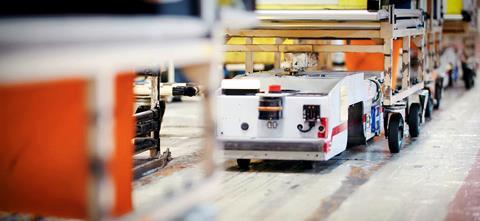The UK government’s recently announced £2 billion ($2.5 billion) Advanced Manufacturing Plan includes a new Battery Strategy that will see £50m of government funding allocated to deliver a globally competitive battery supply chain by 2030.

The move aims to build in supply chain resilience as vehicle makers localise battery production in support of the transition to battery electric vehicle (BEV) production.
The Battery Strategy will provide targeted support for zero-emission vehicles, batteries and supply chains, including new capital and R&D funding for five years to 2030. That commitment builds on the work of the Automotive Transformation Fund and the Advanced Propulsion Centre.
The government said that the battery sector could create 100,000 highly paid and skilled jobs in the UK.
“Growing the battery industry is vital to positioning the UK as the best location in the world to manufacture electric vehicles, and building on the confidence we’ve given our supply chain through recent successes such as the investments from Tata, BMW and Nissan, plus the wealth of government support available to businesses,” said industry minister Nusrat Ghani.
According to the UK Battery Strategy outline, securing investment in the battery supply chain is key to the UK’s economic security. The country currently meets most domestic demand for batteries and their components through imports, said the UK Department for Business and Trade. EV production relies on China as the largest import source of lithium-ion batteries for and 2022, the UK imported nearly £1.8 billion worth of lithium-ion battery packs, of which around £0.9 billion came from China, £0.3 billion from Germany, and £0.1 billion from Japan.
Private investment spur
Nissan announced in November that it will invest £3 billion in its EV36Zero hub for the production of three BEV models at its Sunderland plant. According to the OEM, the forthcoming models – the Qashqai and Juke – will join the electric Leaf, and total production will require a third gigafactory, according to Nissan.
Tata has also announced a £4 billion gigafactory that will provide almost half of the battery production needed in the UK by 2030. Tata owns JLR and the gigafactory will supply the carmaker’s future BEV models including the Range Rover, Defender, Discovery and Jaguar brands. It will also have the potential to supply other carmakers.

Production at the new gigafactory is due to start in 2026 and, at 40GWh capacity, it will be one of the largest gigafactories in Europe, creating up to 4,000 jobs, as well as thousands of further jobs in the wider supply chain for battery materials and critical raw minerals.
“Tata Group’s multi-billion-pound investment in a new battery factory in the UK is testament to the strength of our car manufacturing industry and its skilled workers,” said prime minister Rishi Sunak.
In addition, BMW has announced a £600m investment package at its Oxford car plant and Swindon body-pressing facility for production of the electric Mini. The Oxford plant will assembly two new all-electric Mini models from 2026, the 3-door Mini Cooper and the compact crossover Mini Aceman. From 2030, the Oxford plant will produce all-electric Mini models exclusively. BMW is extending the current body shop and a new area for battery installation, and it said additional logistics facilities will be built on both the Oxford and Swindon sites. The carmaker also said that the Oxford and Swindon plants already use digitalisation and virtual planning tools to configure buildings and systems, streamlining the planning of logistics routes, and material and traffic flows.
Bentley, which is owned by VW Group, has also announced a £2.5 billion investment to produce its first EVs in Crewe by 2026.
Ford said it welcomed the government’s commitment to support EV and battery manufacturing in the UK.” We have already invested over £400m in two years, with the support of government, to transform Ford facilities in the UK to develop and produce EV components,” said Lisa Brankin, Ford UK’s chairperson. ”Extending Freeport benefits will assist the Thames Estuary Freeport, with Ford Dagenham a key partner. The Freeport is driving growth for businesses along the Thames corridor and will deliver local regeneration and job creation.”
Freeports will benefit from a range of customs measures, allowing imports to enter the Freeport custom sites with simplified customs documentation and delay paying tariffs.
Long-term funding
The £2 billion Advanced Manufacturing Plan follows an announcement by the UK chancellor Jeremy Hunt that the government is allocating £4.5 billion in targeted funding to back the long-term future of the UK’s manufacturing industries, including automotive, aerospace, clean energy and life sciences. This funding includes support for batteries and industries undergoing fundamental changes to remain at the forefront of the global transition to net zero.
“This additional Government investment reflects the fact the UK automotive sector has the talent, the innovation and the determination necessary to thrive in the face of fierce global competition,” said Mike Hawes, chief executive of the Society of Motor Manufacturers and Traders (SMMT). “It will deliver benefits not just for the automotive sector but for the whole country in terms of growth, high value jobs and productivity. It also sends a powerful signal that the UK is open for business.

























![Global[1]](https://d3n5uof8vony13.cloudfront.net/Pictures/web/a/d/s/global1_726550.svgz)













No comments yet